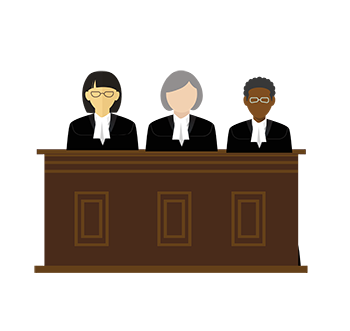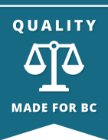The Appellate System
The Court of Appeal is the highest court in BC. Some types of cases can be appealed from lower courts directly to the Court of Appeal, while others first need to go through internal review panels.
How the Court of Appeal works
The Court of Appeal judges sit regularly at the Law Courts in Vancouver and Victoria and, from time to time, in Kamloops, Kelowna, and Prince George. The judges of Court of Appeal are also judges of the Yukon Court of Appeal, which sits twice a year in Whitehorse. The Court of Appeal also hears Yukon appeals cases in Vancouver.
Appeals are usually heard by a panel of three judges. Sometimes a panel of five judges will sit to hear particularly important cases or when they are being asked to overturn a previous Court of Appeal decision.
Who is who
Appeal Court judges are addressed as “Chief Justice” “Justice” or “Mister Justice” or “Madam Justice” depending on the context. The party asking for the appeal is called the “Appellant” and the party arguing against the appeal is called the “Respondent”.
What to wear
As this is a more formal court, the judges and the lawyers wear black robes identical to those worn in Supreme Court. If you are attending a Court of Appeal hearing you should dress appropriately.
Leave v. Right to Appeal
Not all cases are automatically allowed to be appealed to the Court of Appeal. In some cases, the appellant must apply to the court for permission to appeal or “leave of appeal”. Such cases include foreclosure orders and orders for costs. For most cases however, they have a “right of appeal” which means they do not need to ask for permission to appeal.
No New Evidence
 There is very rarely witness testimony at an appeal. In fact, the whole hearing is based on the transcripts of the previous hearings and the written and oral arguments of the parties or their counsel. New evidence may be allowed if a panel of judges allows it. The judges will consider whether the proposed new evidence was:
There is very rarely witness testimony at an appeal. In fact, the whole hearing is based on the transcripts of the previous hearings and the written and oral arguments of the parties or their counsel. New evidence may be allowed if a panel of judges allows it. The judges will consider whether the proposed new evidence was:
- Not available at trial - if it was, the evidence is not likely to be allowed
- Relevant in that it relates to a potentially decisive issue in the case
- Credible in that it can be reasonably believed
- Something that would have changed the outcome.
What can be appealed
An appeal is not a new trial. In order to successfully appeal, the appellant must show that the judge, jury or tribunal, made a mistake in understanding the facts of the case or interpreting the law. However, making a mistake is not enough. The mistake must be so significant that they led to an incorrect decision.





